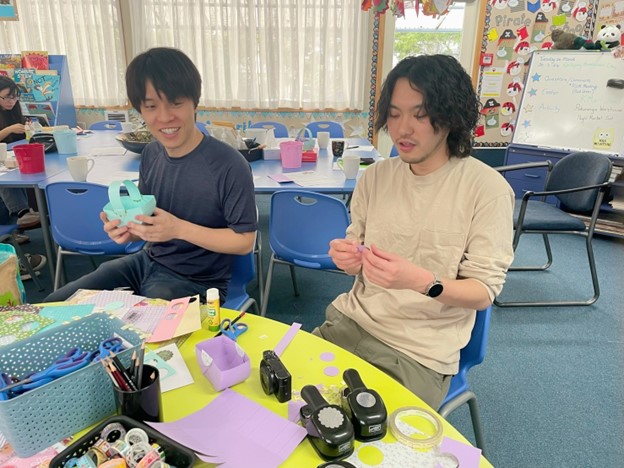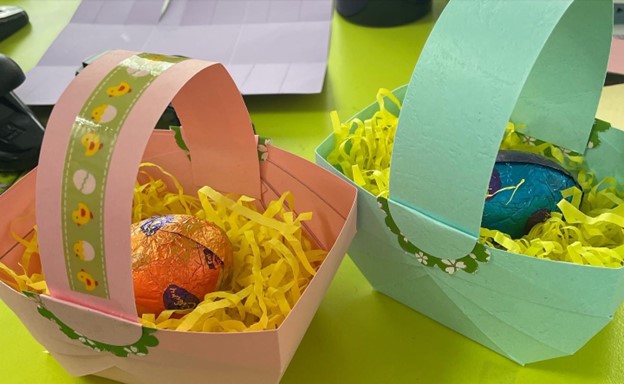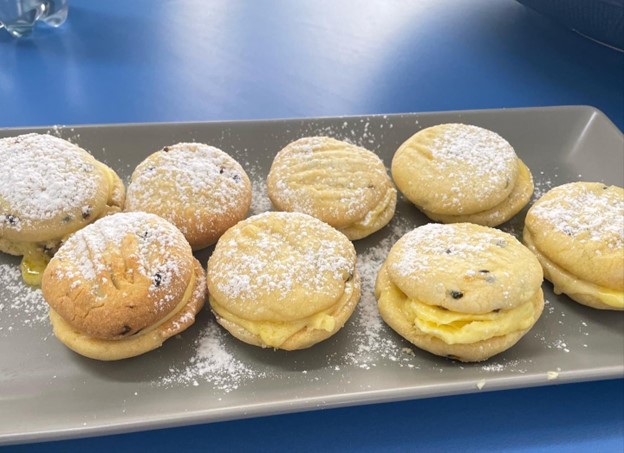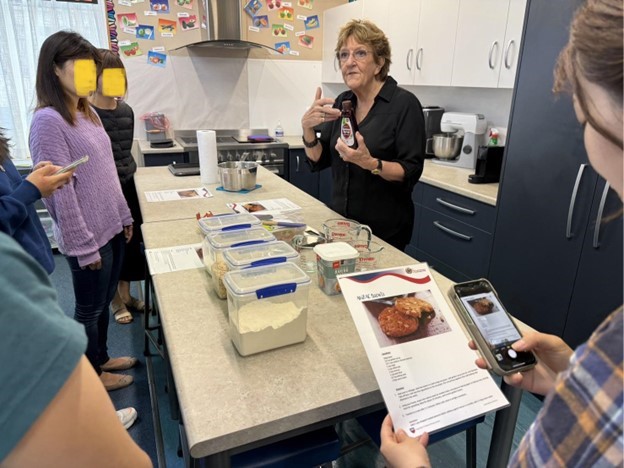Short-term Study Abroad, Elementary School in New Zealand - Parent Class
A parent who joined the New Zealand Elementary School Short-term Study Abroad Program from March 23rd to April 14th, 2024, has contributed to this article by telling us about her experience, in particular, the 'Parent Class' held at the local elementary school. Please check out a report of their overall experience below.
[Report] Short-term Study Abroad in New Zealand - Owairoa Primary School (with video)
In the spring of 2024, when my oldest son was about to move from the Mountain Class (4-year-olds) to the Sky Class (5-year-olds), we joined the New Zealand Elementary School Short-term Study Abroad Program in Auckland. Owairoa Primary School, where my son was to study, also organizes a 'Parent Class' for the parents accompanying their children and this is what the article will be focusing on.
CWhile our children were in school, we would join the Parent Class, which was held from 9am to 10:30am Mon-Fri for 90 minutes, with one teacher and less than 10 participants. According to the staff in the International Student Department, this is the only school in New Zealand that offers a Parents Class for parents/guardians of study abroad students and we weren't surprised to hear that it has been going well.
I will go into more detail later, but in this class, we enjoyed learning about a wide range of topics such as New Zealand education and culture, English language learning, school life for children, all while relaxing with a free drink in our hands.
The other parents in the class were fellow Asians from Taiwan, Korea, China, Japan, Iran etc. Initially I was anxious being in a completely new environment, but I soon felt relaxed and at ease while chatting with the other parents. I had been feeling reluctant to speak English in front of the other parents because I thought I'd embarrass myself, but in the end, everything went just fine. The teacher seemed to have a strong NZ accent, but thankfully they spoke slowly and used plenty of gestures. They also used printouts and videos and I was able to enjoy joining in with all of the class activities, even with my overall comprehension level of about 30%. It was a warm and welcoming atmosphere and I never felt too intimidated to speak English, even though my English isn’t great.
Most days, the first 30 minutes were spent just relaxing and chatting together. During this time, we could ask questions about things that came up during the trip, as well as sightseeing and other daily life matters. After this, the theme of the class was usually decided by what day of the week it was, with about two topics covered per day.
Lesson Content
Introduction to Owairoa Primary School
They took us through the weekly school schedule and other relevant information. For example, the day before the school had a 'mufti day', where the children go to school in their casual clothes instead of their uniform, we were told that we needed to pay $1 to $2 at the school gate, and they also explained how this money is spent. (We were told they were raising money to cover expensive bus fees for extracurricular activities.)
We hadn’t heard anything about this from the homeroom teacher, so if we hadn't been told at the Parent Class, we would’ve sent the kids to school in their uniforms as usual.
Things to See and Do in Auckland
This was a topic that often popped up while we were chatting at the beginning of the class. Before the weekend, they would show us different weekend events in and around the Howick area, where the school is located, by using the screen sharing option on our devices. We learned about flea markets, park and beach events for children, night markets, etc. Then, after every weekend, each one in the class was asked "How was your weekend?" It was interesting to hear what the others got up to, learn about new places to visit and to hear how the locals live as well.
The New Zealand Education System
They went into some detail about specific teaching methods used, such as how they organized and grouped the students according to their level of understanding and how lists are used to increase their English vocabulary. We also talked about high school and university life.
English Language Conversation Skills
We studied English mainly through quizzes and worksheets. Learning about words and idioms unique to New Zealand was really interesting. For example, what are generally referred to as 'beach sandals' in Japan, are known as 'flip-flops' in US and UK English, but in NZ they are called 'jandals'. (Sandals in NZ refer to a different kind of light shoe with open toe work). This term was actually influenced by footwear seen in Japan, where they combined Japan + sandal to create the uniquely Kiwi word 'jandal'.
New Zealand Culture
We also learned about events such as Easter, ANZAC Day and other important days that would occur during our stay. During the Easter period, we wove paper baskets to hold our Easter eggs. When they told us they use the experience of measuring, cutting and weaving paper, similar to origami, to teach the children maths, it reminded me of the International Baccalaureate (IB) teaching method.


New Zealand Cooking Class
We learned about typical food eaten in New Zealand, which we then cooked and tasted for ourselves. At special events, such as at Easter, we made Easter biscuits and classic hot crossed buns, for ANZAC Day we made Anzac biscuits and we also made simple, affordable meals and snacks for kids like Hawaiian pizza or Passionfruit Melting Moments (shortbread biscuits). I looked forward to these classes the most as it was so easy to chat with each other as we cooked. I recreated the pizza we made in class again for breakfast the very next day and talked about it with the family. We've also been using some of the other recipes back in Japan.



NZ Curriculum and Assessments
We talked about the grades, evaluation methods and the different activities they use for each subject at Owairoa Primary School. In terms of grades, it seems that Excellent isn't the highest, instead it's Attitude, but I may not be correct as it was a little hard at times to follow the English.
Teaching Reading to your Child at Home
The kids had reading homework everyday so this was helpful. We were told that reading to get an overall sense of the sentence as a whole, rather that reading word by word, is important. We got tips on how to ask questions while we were reading together, which I kept in mind while we read Japanese picture books together. (The tip was to ask questions in a way that could only be answered with some understanding of the story). We learned what kind of books they use and were told about different bookstores.
Summary
While I have separated the different topics into a list, in reality these subjects were covered across multiple lessons. But since we discussed the points in common in some depth, I found these easy to remember. For example, while studying English, it might be mentioned that it is World Unicorn Day and that lead to talking about how the unicorn myth is perceived in New Zealand. Then we might talk about the origin of the word 'unicorn', how uni = 1, bi = 2, tri = 3, etc. and talk about how other words were related to this. We might also talk about how we'd go about introducing this topic in a classroom setting. In this way, many topics could be discussed in one lesson.
I got the impression that they embraced flexibility within the lesson. They were happy to go with the flow of the conversation, but tried to keep it centered around the main purpose of everyone there - the education of their children. Not only was this a good way for us to study English, but it became a priceless and meaningful experience in regards to learning about my children's school life and education, and their life while living in New Zealand.
I enjoyed the New Zealand cooking class the most and the casual conversations during the class were also memorable, with the teacher asking deep questions such as; "What does success in life mean to you?" It was nice to take a mental break from living in a foreign country, hear the thoughts of people from different countries and to reflect on my own opinions on the subject.
I think the best thing that came out of participating in these classes was how much it has motivated me to study English and to spend more time with people of different nationalities. At Owairoa Primary School, where students come from over 50 different ethnic backgrounds, acceptance of other races and languages seems to come naturally to both the teachers and students. People happily talk to you, and while there may be some difficulty understanding each other, there will be no problem recognizing the kindness being extended towards you. I wanted to respond in the same way, but frustratingly I couldn't communicate in English as much as I wanted to.
I'd always wanted to talk more with the foreign teachers at CGK International School, but now, I realize that life would be more enjoyable in general, if I could speak better English. We had done some international travel before, but it had never made me feel this way. Perhaps three weeks gave us enough time to have a rich experience, which helped us to discover these feelings.
I came home feeling positive and inspired and I've been able to continue my English studies, albeit a little at a time. Nowadays, my son has overtaken me in English ability, but I'd love to think that as we both continue to study English, I can also show him how it can lead to a deeper understanding of diversity in the world.



















